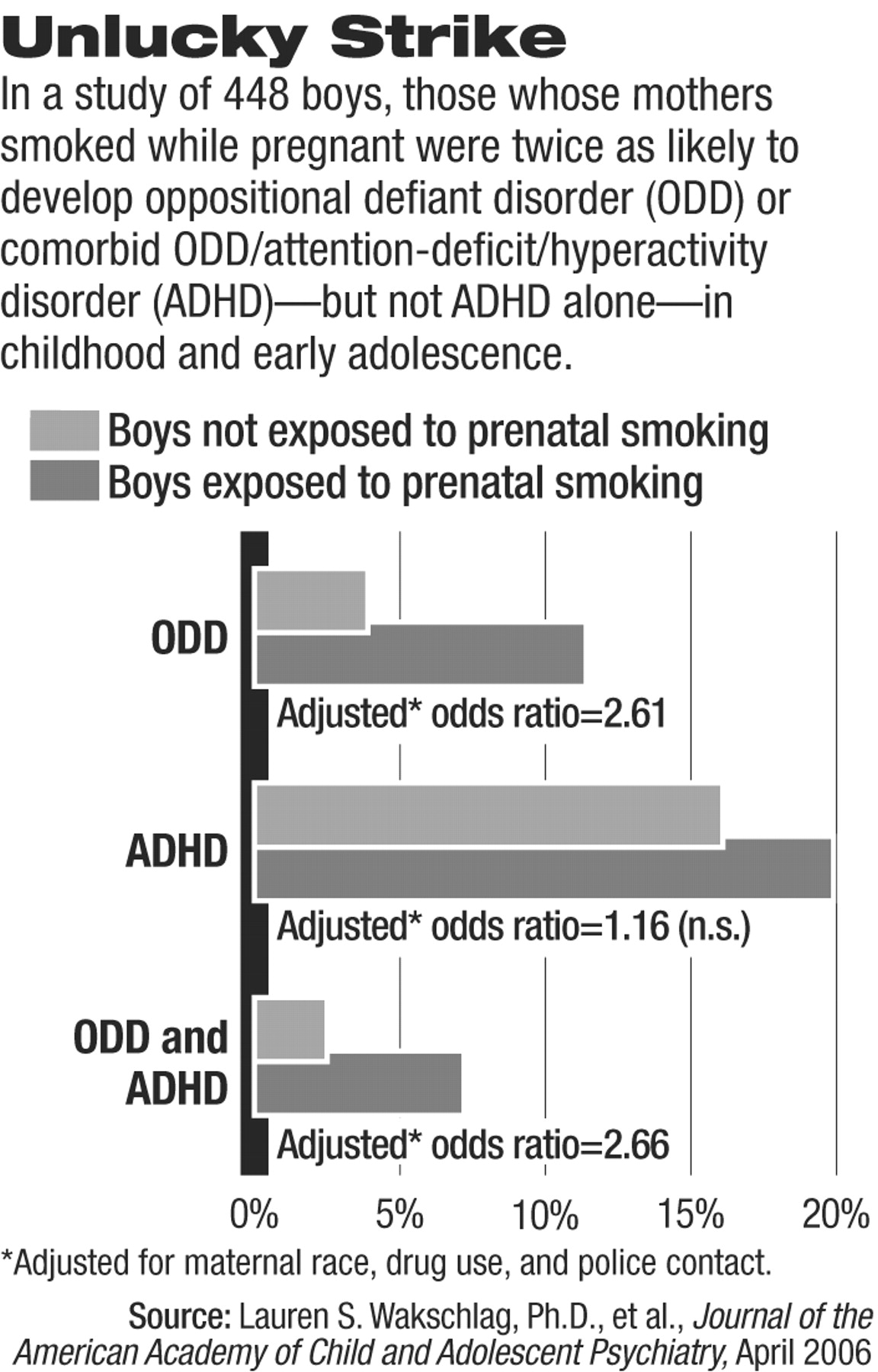Boys born to women who smoked while pregnant are at risk for an early onset of oppositional defiant disorder (ODD), regardless of whether prenatal smoking is a cause or simply an indicator of that risk, according to a study by researchers led by Lauren Wakschlag, Ph.D., an associate professor at the Institute for Juvenile Research in the Department of Psychiatry at the University of Illinois at Chicago.
“There is increasing evidence that the roots of many psychiatric disorders, especially disruptive behavior, reside in the early years of life,” said Wakschlag in an interview. “Studying an identifiable, quantifiable, measurable, and preventable factor like smoking may enable us to think about how insults affect various parts of the brain and how that interacts with genetic susceptibility and postnatal risks.”
Wakschlag and colleagues reported on a cohort of 448 boys first enrolled in the Pittsburgh Youth Study when in the first grade and followed at six-month intervals for four years and then annually until age 19. Their study is described in the April Journal of the American Academy of Child and Adolescent Psychiatry.
Background interviews with the boys' mothers allowed assignment into two categories, those who never or rarely smoked during pregnancy and those who smoked daily. Roughly half the sample was African American, and about 37 percent of the mothers smoked regularly while pregnant.
Boys whose mothers smoked also had other indicators that could put the children at risk of ODD. Their mothers were more likely to be unmarried, have a high school education or less, use alcohol or illicit drugs when pregnant, use frequent physical punishment, and have more contact with police.
After adjustment for these factors, odds ratios for ODD more than doubled (OR=2.61) for boys whose mothers smoked, compared with the children of nonsmokers. However, prenatal maternal smoking did not appear to increase risk of attention-deficit/hyperactivity disorder (ADHD) (adjusted OR=1.16, N.S.). The study did not include teacher reports of behavior problems.
Comorbid ODD and ADHD among youth whose mothers smoked may “reflect a particularly severe subtype of disorder rather than merely the additive manifestation of each disorder in its pure form,” the researchers said.
Earlier research by others has produced a mixed record on a connection between maternal smoking and ADHD, Wakschlag told Psychiatrc News. She can't say if the link demonstrated in her current study is causal, but hypothesizes that the co-occurrence of ADHD and impulsivity/aggression may be more significant than the effect of smoking on attention per se.
“The odd thing is that [other studies have not found] a strong relationship between these behavioral disorders and illicit drugs, but a legal substance like tobacco has a robust association,” she said.
The researchers divided delinquent behavior into minor (for example, stealing from a parent's wallet or minor shoplifting) and major (fighting, carrying weapons, or committing major felonies) levels. There was no difference in age at onset of minor delinquency between boys exposed to smoking in utero and those who weren't exposed, but boys whose mothers had smoked began major delinquent activity at a significantly earlier age, at age 13 rather than age 15 for their unexposed peers.
“We hypothesize that the primary deficits of exposed offspring reflect socially resistant and impulsively aggressive behavior,” wrote Wakschlag and colleagues. Exposure is associated with social intransigence, poor social competence, and heightened aggression in exposed toddlers, according to other research Wakschlag plans to publish this summer.
The study seems to reveal a phenotype of behavior problems related to maternal smoking, but not necessarily causality. For instance, a mother's smoking while pregnant may be a marker for her own antisocial behavior, which the child emulates, but postnatal and secondhand smoking may also influence the child's behavior.
Study of possible biological mechanisms by which prenatal smoking affects the behavior of offspring is still in an early stage. Animal experiments have found that premature stimulation of nicotinic receptors disrupts fetal brain development and involves the noradrenergic, dopaminergic, and serotonergic neurotransmitter systems. How that translates into complex disorders in humans isn't clear, said Wakschlag.
“Establishing causal pathways from a prenatal event to a disorder that emerges many years after birth presents substantial scientific challenges,” the researchers wrote, but prospective studies that included both self-report and biomarker levels would begin to answer questions of causation. Such studies might not only track the role of prenatal smoking in the development of conduct problems, but also more broadly illuminate the connection between brain and behavior in psychiatric disorders generally.
Wakschlag is collaborating with geneticists and neuroscientists on a prospective study sponsored by the National Institute on Drug Abuse, which will combine prenatal data with behavioral outcomes in the now-adolescent children.
However, given smoking's known harmful effects, it makes sense to advocate for interventions to reduce prenatal maternal smoking, even as research to determine smoking's connection to psychiatric illness seeks more definitive answers, she said.
An abstract of “Is Prenatal Smoking Associated With a Developmental Pattern of Conduct Problems in Young Boys?” is posted at<www.ncbi.nlm.nih.gov/entrez/query.fcgi?cmd=Retrieve&db=pubmed&dopt=Abstract&list_uids=16601651&query_hl=9&itool=pubmed_docsum>.▪

